Illinois Baptist



What preacher John Piper taught me

Table talk with Jonathan Davis
P. 11
Vision for the New Year

The year past offers glimpses into a few big issues.
Some evangelicals seeking shelter in the maelstrom Gorsuch favors religious liberty; his effect on the High Court
Millennials aren’t as conservative on social issues as their parents
Families embrace their community for the gospel
SBC entities steadier after downsizing and debate

#churchtoo

Churches challenged to baptize 1,000 on one day

Springfield | One thousand baptisms on a single Sunday. That’s the challenge behind One GRAND Sunday, an initiative designed to help IBSA churches train church members in evangelism, share the gospel, and follow-up with believer’s baptism.
One GRAND Sunday is scheduled for April 8, one week after Easter.
“Easter is normally a high attendance day, and the strategy of scheduling April 8 as One GRAND Sunday is to encourage people to return the following week to witness an historic event—their

NATE ADAMS
Back to basics
What drives today’s pioneers
P. 2
SECURITY Churches everywhere beef up
After Texas massacre
P. 4
PUBLIC OPINION
Do you trust pastors? New poll shows decline
P. 5
SANCTITY OF LIFE
New status report & ‘A changed life’
P. 10-11
“In general, countries that are more upbeat about their national economy are more likely to say life today is better compared with the past.”
– Pew Research
Pew asked people in 38 countries whether life in their country is better or worse today than it was 50 years ago for people like them:
In the U.S., 41% of people say life is worse now than 50 years ago, while 37% say it’s better.
– Pew Research, Dec. 2017
the cooperative program

Giving by IBSA churches as of 12/31/17 $5,929,597
Budget Goal: $6,300,000
Received to date in 2016: $6,073,405
2017 Goal: $6.3 Million
Editor - Eric Reed
Managing Editor - Meredith Flynn
Graphic Designer - Kris Kell
Contributing Editor - Lisa Misner Sergent
Multimedia Journalist - Andrew Woodrow
Administrative Assistant - Leah Honnen
The general telephone number for IBSA is (217) 786-2600. For questions about subscriptions, articles, or upcoming events, contact the Illinois Baptist at (217) 391-3119 or IllinoisBaptist@IBSA.org

The Illinois Baptist is seeking news from IBSA churches. E-mail us at IllinoisBaptist@IBSA.org to tell us about special events and new ministry staff.

POSTMASTER: The Illinois Baptist is owned and published every three weeks by the Illinois Baptist State Association, 3085 Stevenson Drive, Springfield, Illinois 62703-4440. Subscriptions are free to Illinois Baptists. Subscribe online at IBSA.org
NATE ADAMSThe recent holiday season gave me a little more time than usual to watch football on TV. As the regular season gave way to playoffs and bowl games, it seemed pre-game analysts spent increasing amounts of time discussing “what it will take to win” the next, tougher game. The more serious the consequence of the game, and the fewer games that remain, the more critical it seems to be able to think, and not just play.
Yet as I’ve listened to experts talk again and again about what it takes to be successful, it seems they often come back to the same basic advice. Focus on fundamentals. Block and tackle well. Everyone do your assignment. Establish the ground game. Everything else you need for success will flow from there.
In these big games, will there be an occasional trick play, or a key turnover, or a missed call that influences the game? Probably. But everyone seems to agree that the best you can do to prepare for victory is simply get back to the basics.
I found myself wondering if there is a reminder, even an exhortation, for churches to consider here. Among the most “basic” practices of Baptist churches as we follow the Lord and pursue his mission are celebrations of the Lord’s Supper and believer’s baptism. Yet these can sometimes seem like occasional, even rare, ceremonies, rather than the very blocking-andtackling basics on which the rest of church life is built.
More than an occasional or routine ceremony, the Lord’s Supper was given to us to be a time of frequent, intimate church fellowship and worship, one that draws each participant to introspection and confession of sin, and to a carefully considered reminder of the price Jesus paid for that sin. The Lord’s Supper is, in itself, a symbol-rich proclamation of the gospel message, one that should, each time, lead us to humble worship and gratitude, and fresh motivation to live out our salvation and to share Jesus with others.
What if we got that “basic” right, every one of us, in every church, every time we celebrated the Lord’s Supper?
If we did, I think it would have a dramatic effect on the other, more neglected, “basic” of baptism. Think of it this way: What if a church were to schedule baptism celebrations as often as it scheduled Lord’s Supper celebrations? More importantly, what if that church adjusted all its other priorities with the goal of seeing at least one person baptized by that time?
In fact, what if the church filled its baptistery on that date, no matter what? If no one was ready to be baptized, the church would simply pray in lament over the unstirred waters, and ask the Lord to guide them to a different result next time.

If the core, blocking-and-tackling tasks of the church are to remember the redeeming sacrifice of Jesus, and continue his mission of seeking and saving the lost, then maybe we need to get back to the basics of the Lord’s Supper and baptism. Maybe we need to let them drive our churches’ priorities and resources and schedules more than the things that drive them now.
As the football analysts remind us at this time of year, the closer we get to the end, and the fewer days that remain, the more critical it is to reflect carefully on what it takes to be truly effective in our mission. That careful reflection will almost always lead us back to the basics, and then forward to victory.
Nate Adams is executive director of the Illinois Baptist State Association. Respond at IllinoisBaptist@IBSA.org.
Does your church need help reaching more people and increasing baptisms? Accept the “Pioneering Spirit” challenge at pioneeringspirit.org.

Now is the time to consider what it takes to be truly effective in our mission.
Springfield | A law allowing abortions to be covered under Medicaid and state employees’ health insurance plan went into effect Jan. 1 in Illinois.
Associate Judge Jennifer Ascher of Sangamon County’s Seventh Judicial Circuit Court in Springfield denied a request Dec. 28 for an injunction against House Bill 40, which also amends the Illinois Abortion Law of 1975 to remove language declaring that an unborn child is a human being from the time of conception.
The ruling came just two weeks before Chicago’s March for Life Jan. 15, when thousands of pro-life advocates gathered in the Loop for the annual event. “It makes no sense that the Illinois General Assembly should support this,” said Dawn Fitzpatrick, president of the March for Life Chicago Board of Directors. “Not only will this law facilitate the death of thousands of additional babies in Illinois, but now we are all forced to pay for these abortions out of our taxes. This is an utterly heinous violation of our consciences, which tell us that every life is sacred.”
Earlier in December, the Chicago-based Thomas More Society had filed a lawsuit to stop implementation of the bill, arguing the
General Assembly had not set aside funds in the state’s budget to pay for the abortions and remain within the Balanced Budget requirements of the Illinois Constitution. It also challenged the law’s Jan. 1, 2018, effective date.
In the Dec. 28 hearing, Thomas More Society counsel Peter Breen argued the law could not become effective until June 1, 2018, because it missed a May 31, 2017 cut-off date for General Assembly action. He also further disputed the state’s ability to fund the bill. In her ruling, Judge Ascher said the judiciary should not intervene in “political questions” in the General Assembly. Calling the budget issue a “legislative dispute,” Ascher said, “Legislative disputes must be resolved in the legislative arena. It is inherently a political question and I cannot mandate the process on the estimate of revenues or the appropriation of those revenues.”

On Jan. 2, attorneys for the Thomas More Society appealed Judge Ascher’s decision and are awaiting action from Illinois’ Fourth District Appellate Court.
– Lisa Misner SergentColumbus, Ohio | Gov. John Kasich (right) signed a law Dec. 22 prohibiting abortions in cases where prenatal tests reveal Down syndrome or if there’s “any other reason to believe” the genetic condition exists.
The bill was Kasich’s 20th pro-life law since he took office in 2013, WORLD magazine reported, including a 20-week abortion ban he signed in December 2016.

“People with Down syndrome, or any other genetic anomaly, should never be discriminated against,” Ingrid Duran of the National Right to Life Committee told WORLD. “These babies always deserve protection, and families deserve a better option than abortion.”
The law, which goes into effect March 22, will mean physicians who perform abortions after a diagnosis of Down syndrome would face a fourth-degree felony, USA Today
reported, punishable by up to 18 months in prison and a $5,000 fine.
Ohio isn’t the first state to pass a Down Syndrome abortion ban. North Dakota and Indiana have similar laws, although the Indiana ban was blocked by a federal judge in 2016.
From the front: one grand sunday
Continued from page 1
church being a part of 1,000 people being baptized on one day!” said Pat Pajak, IBSA’s associate executive director of evangelism.
The baptism-focused Sunday is part of a series of “Pioneering Spirit” challenges put before IBSA churches at the 2017 Annual Meeting. The evangelism challenge is for 200 or more IBSA churches to baptize 12 or more people each year, or to baptize more than the church’s previous three-year average. In other words, the commitment is for IBSA churches to become “frequently baptizing churches.” So far, 57 churches have accepted the challenge to engage new people with the gospel.
“Unfortunately, baptisms across our state have been declining over the past several years, and I would like to see One GRAND Sunday serve as a reminder that the church exists to evangelize and baptize those in the communities where God has planted them,” Pajak said.
The One GRAND Sunday emphasis coincides with a North American Mission Board-sponsored effort to promote gospel conversations, or opportunities to share the gospel. NAMB is urging Southern Baptists to have one million gospel conversations by next summer’s Southern Baptist Convention in Dallas. At gcchallenge.com, people can upload videos of themselves sharing about gospel conversations they’ve had, and get more information about gospelsharing resources, like the “3 Circles” guide.
With just under three months left until April 8, Pajak suggested this timeline for churches preparing for One GRAND Sunday:
January: Collect your church’s baptism numbers for the past three years. Prayerfully set a new goal for this year.
February: Announce the baptism event and launch gospel conversations. Register your goal at IBSA. org/Evangelism. Conduct the training for church members. Consider teaching the “3 Circles” method.
March: Promote One GRAND Sunday. Personally follow-up with prospects and new believers. Teach about baptism, either personally or in a group setting.
April 8: Baptize!
April 9: Start over again.
One thousand is a large number, but Pajak put the goal in perspective. “What may look like a very lofty goal can easily be accomplished if every one of our 1,000 churches simply committed to baptizing one person.”
For more information about One GRAND Sunday and evangelism resources, or to register to participate in the April 8 emphasis, go to IBSA.org/Evangelism.

The Nov. 5 massacre at a small Southern Baptist church in Sutherland Springs, Texas, was the deadliest mass shooting at a church in U.S. history. Sadly, though, it wasn’t the first.
It was just two years ago that nine people were killed during a prayer meeting at a South Carolina church. It was less than 20 years ago that a gunman entered Wedgwood Baptist Church in Ft. Worth and killed eight people.
Still, though, many church members can’t believe it could ever happen “here.”
It could. It already has. In March 2009, Pastor Fred Winters was shot and killed while preaching at First Baptist Church, Maryville. Rich Cochran, director of leadership development at IBSA, was serving as minister of education and children at FBC Maryville at the time.
“We ignore reality because we don’t want to face it and don’t know what to do,” Cochran told the Illinois Baptist. But in the aftermath of the shooting at FBC Sutherland Springs, churches around the country are re-evaluating their security plans.
GuideStone Financial Resources and Brotherhood Mutual Insurance Company offered two seminars in November for Texas churches interested in learning about implementing best practices for volunteer church safety and security teams. In December, the Southern Baptists of Texas Convention and Prestonwood Baptist Church hosted seminars on “Church Security in the 21st Century.”
Pastor Dick Sisk commended church security training events but said small churches can take action even as they wait for the next convenient training event. His church, Tarpley Baptist, is, like FBC Sutherland Springs, small, rural and in the San Antonio area. The day after the Sutherland Springs attack, Sisk met with two law enforcement officers
in the congregation to hammer out a security plan “that was adapted to our particular situation,” Sisk said.
Tarpley’s plan includes proactive measures to prevent crimes at the church, procedures to employ in the event of an active threat, and protocol to follow after a security threat has passed.
During worship services—which generally are attended by 80-95 people—the congregation always has a marked law enforcement vehicle parked near the parking lot entrance, Sisk said, and the two law enforcement officers in the church are armed and
seated strategically in the auditorium. Greeters, workers in the sound booth, and a team of security volunteers also have been assigned security duties. Pastors should “sit down with people in law enforcement,” Sisk said, “even if they go to another church.”
When asked what advice he would give to pastors and staff thinking about putting a church safety plan together, Cochran said it’s important that pastors and staff mentally and verbally process what they would do were such a thing to happen.
“Review your risk, take an assessment, know where your vulnerabilities are, minimize those vulnerabilities, live out your mission,” Cochran advised.
He also noted, “It’s important congregations be extremely friendly, engaging everyone. Then, you can notice when something isn’t right. Then, it doesn’t seem like you have the National Guard in your lobby. The best way is to train people to be nice and to welcome everyone.”
There is a danger in letting fear take hold, he cautioned. “If we pat our heads and build megaforts around ourselves, we do a disservice to missionaries. If we protect ourselves so much it disrupts our mission, we’re out of whack. There is a constant tension.”
Prayer does play a role. “We need to pray, yes, we need to prepare,” Cochran said, nodding. “Yes, we need to live by faith. We live in a world where evil is present. Even Jesus said there would be troubles.”
In the simplest of terms, Cochran urged, “Prepare, prepare, prepare. Then you have to walk by faith. We’re called to illuminate the darkness.”
– Lisa Misner
Thom Rainer said recent church violence was a tipping point that led to a “new normal” for churches. The president and CEO of LifeWay Christians Resources conducted online surveys about how churches are operating within their new normal related to church security. Here’s what they said:
1. Church security measures have shifted dramatically. While church security measures are not new, there has been a noticeable change since the November 2017 shootings. Many churches instituted church security measures for the first time. Even more implemented additional security measures after the 2017 shootings.
2. There is a resistance to church security measures by a vocal minority. This perspective holds that the measures are an
overreaction, or that it goes counter to the biblical truth of trust in God. There was a similar reaction in the early 2000s when churches started requiring background checks for those who worked with children. The latter protest is almost nonexistent today. The resistance to implementing church security for shooters will likely dissipate as well.
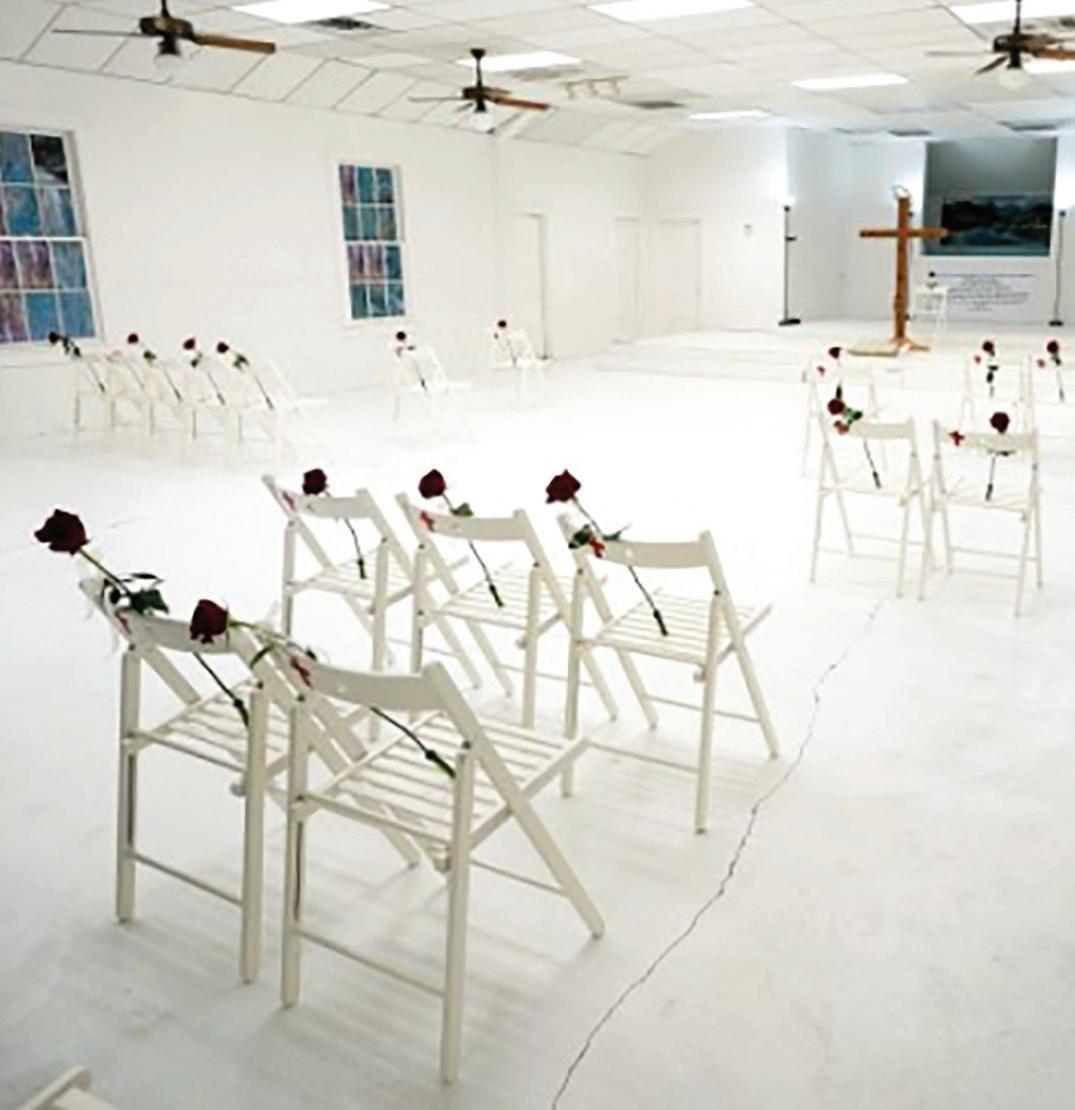
3. One of the most common responses by churches is partnerships with local law enforcement. Many churches have hired off-duty police officers to be vigilant and visible when the church is gathered. Others have sought the law enforcement community to educate and train their members about this issue.
4. Many churches are using their members to assist in church security. Churches are commonly offering security training sessions to their members. Others are using members to patrol the grounds or to become volunteer security guards.
5. Churches are using technology to enhance their security. For example, even some of the smaller churches are using advanced video security systems, especially now that the technology has become more affordable.
6. More guests are asking questions about church security. When the sex abuse scandals become pervasively known,
many church guests would not visit a church unless this issue was clearly addressed. The same is now true for the security toward church shootings. If churches do not provide clear and visible protection for those gathered, many guests will not come.
7. There is a general sadness among churchgoers that we have come to this point. Church members as a whole would like their churches to be wide open and welcoming. They don’t like locked doors, security cameras, and guncarrying members. But they realize this reality is here to stay. For that reason, they are sadly resigned and accepting.
This article was originally published at ThomRainer.com on Jan. 8, 2018. Thom S. Rainer serves as president and CEO of LifeWay Christian Resources.

After Sutherland Springs, churches face ‘new normal’ LifeWay’s Rainer finds significant shifts in security measures
new poll: nurses # 1
When Gallup’s annual survey of Americans’ view of the honesty and ethics of various professions was released late last year, it included bad news for ministers. Clergy saw its lowest ranking on the list to date, with 42% of people ranking their honesty and ethical standards as very high or high; 41% giving them an average score; and 13% expressing a low or very low view of their ethics.
“Gallup has measured Americans’ views on the honesty and ethics of the clergy 33 times dating back to 1977,” the researchers reported. “Although the overall average positive rating is 55%, it has fallen below that level since 2009.”
In 2002, amid the sexual abuse scandal in the Catholic Church, the percentage of people who rated clergy’s honest and ethics as high or very high dropped 12 percentage points, to 52%. “While positive ratings of the clergy’s honesty and integrity rebounded somewhat in the next few years,” Gallup reported, “they fell to 50% in 2009 and have been steadily declining since then.”
Nurses are at the top of this year’s list, as they have been for every year of polling except one. In 2001, shortly after the September 11 terrorist attacks, firefighters took the top spot.
– From Gallup.com
Nashville, Tenn. | Going to church for some can be a bit like hanging out at Starbucks. The coffee’s hot, the people are friendly, and the Wi-Fi is almost always free.
A new survey from LifeWay Research found 68% of Protestant churches provide Wi-Fi for both guests and staff, and 84% have a website and a Facebook page. Fewer—16%—have ventured on Twitter.
Once wary of technology, Protestant churches now seem all in, said Scott McConnell, executive director of LifeWay Research. It’s another way to connect with guests and worshipers alike.
“Not long ago churches’ use of technology was often limited to a website that functioned like the Yellow Pages or a bulletin board,” McConnell said of the study conducted Aug. 30 to Sept. 18, 2017. “Now they see technology as a way to interact with people. Wi-Fi is just one more way to do that.”
The use of Facebook by churches has emerged rapidly. A 2010 LifeWay Research study found that only 47% had Facebook pages. Now, even most small churches— those with fewer than 50 attendees—are likely to have a Facebook page. Larger churches— those with 250 or more attenders—are more likely to also use Twitter and Instagram.
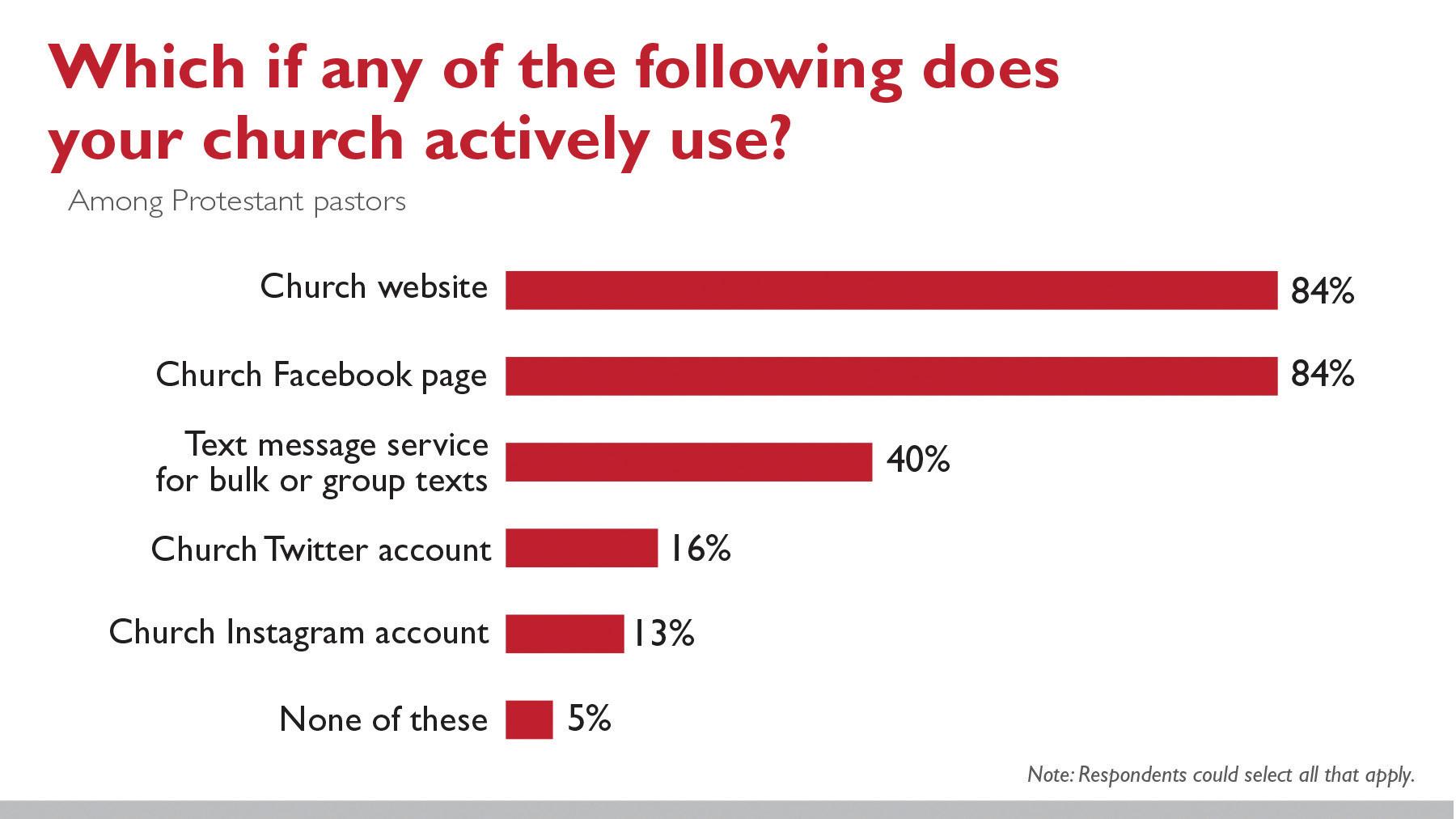
Most churches aren’t afraid of new technology, according to LifeWay Research. Only 2% of churches say they avoid new technology, while 14% say they are slow to adopt it. And more than half of churches (61%) are open to new technology but don’t go looking for it.
That’s especially true when it comes to online giving. Despite the popularity of electronic bill-paying, only about 30% of all churches in the study allow online giving through their website.
That’s up from 14% in 2010, according to LifeWay Research. Still, McConnell expected that figure to be higher, given that Americans pay more than half of their bills online, according to a 2017 report from ACI Online.
Bigger churches—those with 250 or more attenders—seem to love online giving, as 74% of them offer it on their websites. By contrast, 39% of churches with 100 to 249 attenders offer online giving. And only 23% of churches with 100 attenders or fewer offer online giving.
“Technology is great,” McConnell said, “but smaller churches still like to pass the plate.”
– From Baptist Press

Three administrators at Chicago’s Moody Bible Institute announced this month they are stepping down: President J. Paul Nyquist and Chief Operating Officer Steve Mogck have resigned, while Provost Junias Venugopal has retired, Christianity Today reported.
“They are godly, honorable men to whom we entrust to the Lord and offer our deep gratitude for their years of faithful service to Christ and to Moody,” said Randy Fairfax, chair of the board of trustees. “However, we are unanimous in our decision that it is time for a new season of leadership.”
The leadership changes come amid tensions over Moody’s decision to close its campus in Spokane, Wash., and terminate 10% of its Chicago faculty, according to CT
Houses of worship damaged by natural disasters are now eligible to receive funding from the Federal Emergency Management Agency (FEMA), the Washington Post reported Jan. 9. The agency will accept applications for relief from churches and other nonprofits until Feb. 4.
Following devastating hurricanes in 2017, three Texas churches and two Florida synagogues sued FEMA after they were denied assistance. President Donald Trump expressed support for the churches, tweeting that they should be entitled to FEMA reimbursement.
For the 16th consecutive year, North Korea is the country where Christians are most severely persecuted, according to the annual World Watch List released by Open Doors USA. The list calculates the level of persecution in countries around the world by looking at the number of violent incidents against Christians and the church, and the level of pressure felt by Christians in five areas: church life, national life, community life, family life, and private life.

Afghanistan, Somalia, Sudan, and Pakistan round out the top five on the most recent World Watch List. Open Doors reported 215 million Christians—one in 12 worldwide—experience high levels of persecution in the countries on the list.
– Christianity Today, Washington Post, Open Doors USA Get breaking news in The Briefing online, posted every Tuesday at www.ib2news.org.
SBC leaders asked churches to spend extra time in prayer in January. Here’s why.

“I’m convinced that weak prayer is one reason the North American church is not making much difference.”
– Chuck Lawless, dean and vice president at Southeastern Seminary in Wake Forest, N.C., at ChuckLawless.com

“God does not need us to pray in order to move, but in his sovereignty he has chosen to work in power, time and time again, in response to the concerted cries of his people.”
“... God does things when we pray and fast that he does not do if we don’t pray and fast.”
“If we believe God can do anything with anyone at any time, then we can offer up prayers for the lost perpetually… Only through God opening their eyes and minds will the unsaved see and hear the Good News of Jesus Christ. We need to pray for them and appeal to God for this to happen.”
Joe Oliver met me at the front door yesterday. One of our faithful zone consultants, Joe was in town for the monthly team meeting before returning to his ministry field in the Chicago suburbs. “We’re praying for you,” he said, helping me pull the door open. His wife, DeWanna, had said the same thing to me on the same spot the month before. And in that moment, I realized that I still miss my mother-inlaw.
Folks at my house have been on the injured-reserve list for a while, and I took my turn recently. In this protracted season, I have witnessed Christ at work through coworkers and their wives who have fed us and cheered us and prayed for us. The same is true of church family, who prove they are truly family, when you need them. The soups and casseroles have been terrific, but it’s the assurances about praying for us that stick with us most.
“We’re praying for you” really means something when you know it’s true.
I used to call my grandmother on occasion and ask her to pray for me, especially during college exams. (Desperate times, desperate measures, you know.) And where she left off, my mother-in-law picked up. “Call your mother,” I’d say to my wife. Especially as a pastor in a troubled inner city, I knew we
needed to send for back-up. And we got it from 600 miles away. She prayed faithfully, and she would call back wanting to know the results—because she expected results. Nellie has been with Jesus 12 years now, telling him more directly, I hope, that we need his help. Baptists don’t have a doctrine of the communion of the saints, but I hope in the Hebrews 12:1 cloud of witnesses, a picture of the packed stadium at an Olympicsstyle event, that there’s room for my mother-in-law and so many others still cheering us on toward the faithful completion of our own race.
And not Nellie only.
Over the years, I have counted on the prayers of Louise, Leo, Ruthie, Ethel, Pat, Pam, Carole, Sheila, Yvonne, Bev, Sherry, Millie, Bea, and Arlene, among others. And more recently Susan, Beth, Robin, Kathy, Tammie, Jean, Miriam, Ashley, Diane, and many, many others. And that’s just the women.
I’m beginning to understand why Paul’s “conclusions” to his short letters are so long. There are so many people who deserve a “thank you” for their faithful intercession. If I haven’t said it adequately out loud, please know I’m saying it in prayer.
Trinity offers more than 70 programs of study, providing an education that is grounded in scripture with real world experience. Since we’re located just 25 miles north of Chicago, you’ll have the opportunity to live, learn, and serve where you can engage with the world and shape your community.

60015 800.822.3225

If evangelicalism is having an identity crisis, as some religious and cultural observers posit, the issue is whether “evangelical” means a person’s theological beliefs and practice, or is it adherence to a conservative political movement. It has at times meant both, and at points in 2017 we saw the movement struggling with itself over which is “the main thing.”
In this short collection of news stories from last year, we see how evangelicals balanced belief and practice. We witnessed the thumb-wrestling of “Big-E Evangelical-
ism,” inheritors of the socially conservative political force Moral Majority and keepers of its dwindling flame, and “little-e evangelicalism,” the smaller group who are not merely self-identified evangelicals, but whose coregroup of beliefs about Scripture, Jesus, and their relationship to him directly affect their behaviors and drive their moral decisionmaking.
Donald Trump would not be president without evangelicals, more specifically Big-E Evangelicals, and the presence of some in his administration serves as a reminder of
P. 8
Presidential Advisors
Former Southern Baptist Convention President Jack Graham (left of Vice President Mike Pence in the photo above) was among the religious leaders who stood behind President Donald Trump when he signed an executive order on religious liberty in May. Graham and several others with Southern Baptist ties have served on Trump’s team of evangelical advisors. Screen capture from WhiteHouse.gov
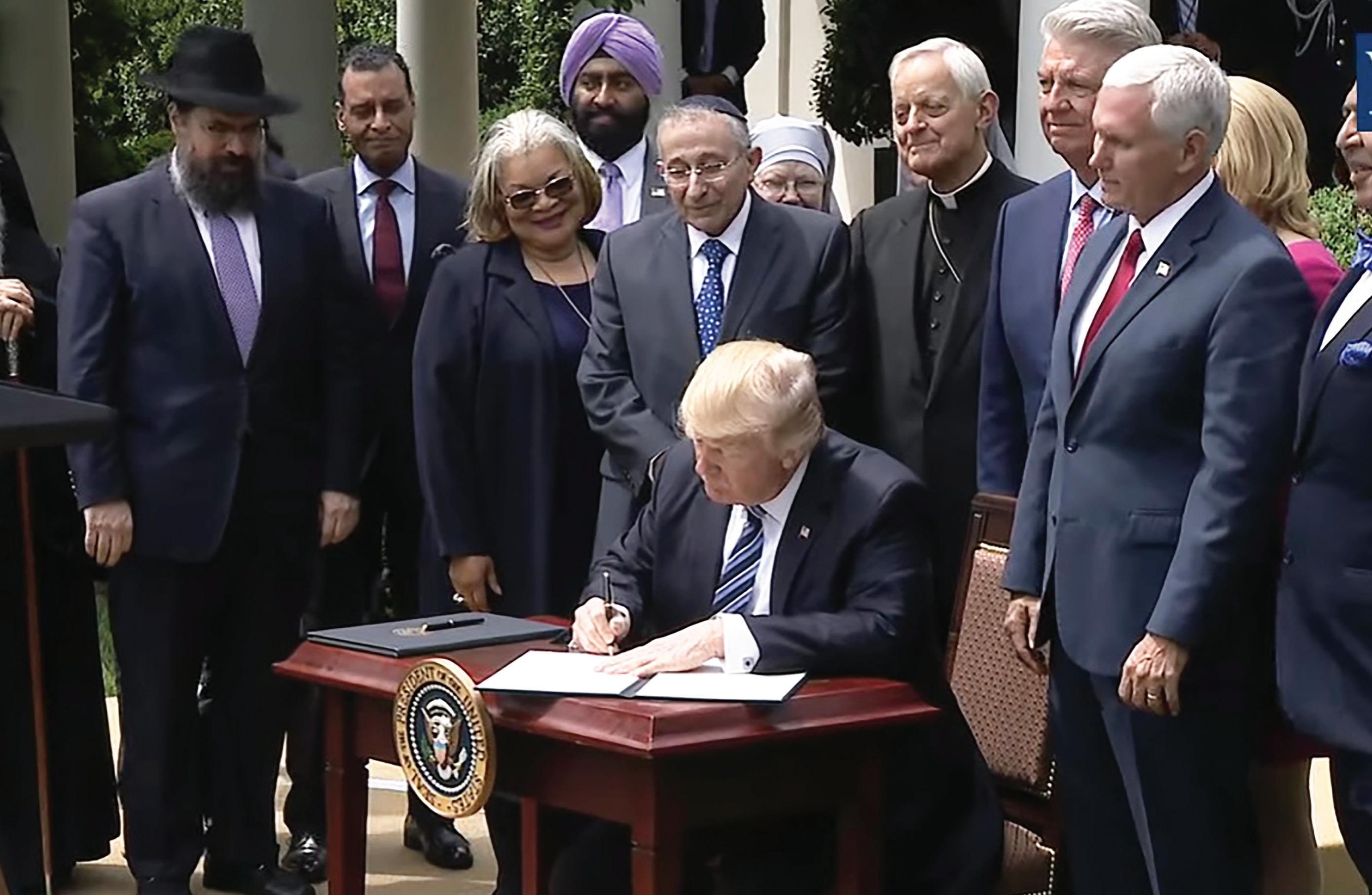
that. There is a group of cabinet leaders and others who meet weekly for Bible study. Spokeswoman (and preacher’s daughter) Sarah Huckabee Sanders is possibly the most visible Evangelical in the White House through her daily televised press briefings.

Trump’s appointment of Neil Gorsuch to the U.S. Supreme Court as a hoped-for advocate for religious freedoms was hailed by church leaders. And Southern Baptists were present on several occasions in 2017 when President Trump signed legislation affecting religious liberty.
But the December loss of a U.S. Senate seat by Republican Judge Roy Moore, Alabama’s Ten Commandments champion, to a pro-abortion Democrat has caused some pundits to wonder if the Big-E political/Republican alliance has weakened, and what that might mean for President Trump in the future. Given the special circumstances in that Senate race, moral accusations against Moore, another conclusion is that the biblical beliefs of little-e evangelicals trumped the Big-E political machine in the privacy of the voting booth.
Similarly, a Democrat easily won the governor’s race in Virginia, whose considerable Evangelical population had previously supported a string of GOP governors. Conservative analyst Stephen Mansfield wrote in a new book that the loss can be attributed partly to the disaffection of evangelicals.
“The young, probably in reaction to Trump and to some of the machinations on the Right, went strongly for the Democrat. I think that is an indication of future trends,” Mansfield said in an interview. “It will probably settle down, but I think that the social consciences of the young are raising some important questions.”
But can those assumptions be applied to the President himself, who a year ago got 81% of the white, evangelical vote? “He’s had about a 10-15% drop-off in support from the evangelical community since taking office,” Mansfield summarized. “So while there may be a sort of exaggerated self-reporting around the time when an evangelical casts a vote, there is some indication that there was never really that depth of devotion. I don’t think their support was ever very deep, and it seems to be weakening quickly.”
One conclusion is that little-e evangelicalism—personal, biblical belief and practice— is being separated from its Big-E political counterpart in this generation.
“Many have analyzed the weaknesses of the current iteration of this movement,” writes conservative Presbyterian pastor Tim Keller. “The desire by mid-twentieth-century leaders to foster more widespread cooperation between evangelicals and downplay denominational differences cut believers off from the past, some religion scholars have found…. This has made present-day evangelicals more vulnerable to political movements that appeal to their self-interest, even in contradiction to biblical teachings, for example, about welcoming the immigrant and lifting up the poor. However, evangelicalism is much more resilient than any one form
of itself. The newer forms that are emerging are more concerned with theological and historic roots, and are more resistant to modern individualism than older, white Evangelicalism.”
Issues in Illinois
Governor’s race: Evangelicals disappointed by Gov. Rauner’s support for HB 40, which allows state-funding of abortions involving state employees and aid recipients, will be looking for a gubernatorial candidate to support in 2018. Pro-life advocate Jeanne Ives of Wheaton said she would run against Rauner in part because of his signature allowing the abortion legislation. Ives handily won a January straw poll against Rauner among Chicago-area Republican leaders, but she faces an uphill climb against the well-funded incumbent. Seven Democrats are on the March 20 ballot with J.B. Pritzker the apparent leader.
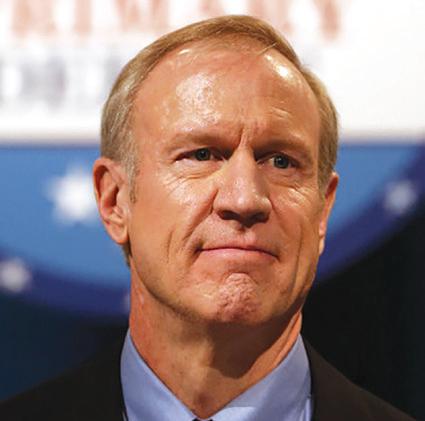
The general election is in November.
Social issues: After successfully moving legalization of same-sex marriage through the Illinois General Assembly, State Senator Heather Steans and some other representatives are preparing to introduce legislation to legalize marijuana use in Illinois. Steans is using economic growth as an argument for legalization, citing a prediction that 250,000 jobs will be created in the “cannabis industry” by 2020. “As many of you may have heard, U.S. Attorney General Jeff Sessions announced last week that he was rescinding an Obama-era policy that discouraged U.S. attorneys from prosecuting operations in states that legalized marijuana,” Steans wrote to supporters.
“This change will not diminish our efforts to legalize adult-use cannabis in Illinois.”
A public hearing is scheduled for late January.
Keller wrote in The New Yorker after the Alabama Senate election. Mansfield’s book, “Choosing Donald Trump: Anger, Hope, and why Christian Conservatives Supported Him,” is published by Baker Books.
Christians and other conservatives hoped the U.S. Senate’s confirmation of 49-year-old Neil Gorsuch to the Supreme Court in April would tilt the court toward a favorable view of religious liberty concerns. As a U.S. Court of Appeals judge, Gorsuch’s rulings supported Hobby Lobby and other organizations that opposed—based on their religious convictions—healthcare legislation requiring their employee plans to cover abortions and abortion-inducing drugs.
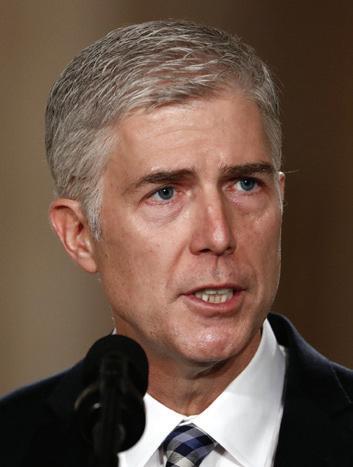
So far, Gorsuch’s previous rulings have extended to his time on the High Court. In June, he was part of 7-2 ruling that found Christian schools should have the opportunity to be awarded government grants for playground upgrades. And this year, the court has agreed to hear the case of Jack Phillips, the Colorado cake artist who refused to design a wedding cake for a samesex wedding celebration.
In 2017, other cases related to religious liberty played out elsewhere in the judicial system:
On Oct. 6, the Department of Health and Human Services issued new rules to provide relief from the requirement that employers provide their workers with coverage for contraceptives, including those that can potentially induce abortions. But a Dec. 15 ruling by a federal court in Philadelphia blocked enforcement of the new rules.
And late last year, the Oregon Court of Appeals ruled that the state did not violate the First Amendment rights of Aaron and Melissa Klein, who were fined $135,000 in 2015 for refusing to design and bake a cake for a lesbian couple’s commitment ceremony. The three-judge panel upheld a decision by the Oregon Bureau of Labor and Industries that found the Kleins’ refusal was based on unlawful discrimination against homosexuals.

While Gorsuch’s presence on the Supreme Court was a victory for religious freedom advocates, mixed results from other courts could indicate a contentious year ahead, and new territory for the church to navigate.
– With reporting from Baptist Press
Late last year, an election night conversation turned to a surprising topic: the divides among evangelicals. Commenting on the likelihood of controversial Senate candidate Roy Moore carrying Alabama’s Christian voters, Rick Santorum—a Catholic and former presidential candidate—said the major differences among evangelicals are generational in nature. Younger evangelicals, Santorum said, aren’t as engaged in some issues, specifically abortion, as their parents. The implication: That disconnect could impact how they vote.
The theory is backed up by recent research. On political and social views, Millennial evangelicals are more likely than their older counterparts to take a liberal stance, Pew reported this summer. A 2014 Pew Research poll showed 45% of evangelical Protestants born between 1981 and 1996 support same-sex marriage, compared to 23% of those born before 1981.
Similarly, 51% of Millennial evangelicals say homosexuality should be accepted by society, compared to 32% of older evangelicals.
The differences between younger and older Christians don’t likely indicate Millennial evangelicals are poised for a shift to the left, an article in The Economist posited. Still, the views of younger Christians are pertinent for churches trying to navigate a quickly shifting political and social climate.
Their ability to hold fast to the truths of Scripture, while inviting and encouraging dialogue on difficult and divisive issues, could well shape how post-Millennial generations view the church, and their place in it.

Movie producer Harvey Weinstein was only the first of countless celebrity men disgraced by allegations of sexual harassment and assault in 2017. And as the names added up—each seemingly more famous and more familiar and more unlikely than the last—so did the names and faces of their victims.
On social media, #metoo became a rallying cry for women who have been abused or oppressed or pushed aside or used by men in power.
When Time named their most influential people of 2017, “the silence breakers” topped the list.
And lest those outside of Hollywood or Washington fall prey to a cavalier “who’s next” attitude,
Two of the Southern Baptist Convention’s most visible leaders weathered a year of contro versy and change in 2017, but appear ready to get back to the mission at hand in the coming year.
Just over a year into his presidency, the International Mission Board’s David Platt led a large-scale reduction in missionary personnel in an effort to right the organization’s financial ship. Now, two years after more than 1,100 missionaries and stateside staff transitioned out of their roles with IMB, the world’s largest Protestant missions organization is on “firm financial ground,” Platt reported.

And Russell Moore, president of the Ethics and Religious Liberty Commission, apologized for harsh comments he made about evangelicals’ support of Donald Trump’s candidacy. But he also spoke in favor of a resolution condemning the racism of the “alt-right” movement that gained national attention during the election season.

Speaking not in his official capacity but as a messenger to the Southern Baptist Convention in Phoenix, Moore stood at a microphone amidst a sea of folding chairs and said, “Racism and white supremacy are not merely social issues. Racism and white supremacy attack the gospel itself and the person of our Lord Jesus Christ.”
The moment culminated a rollercoaster year for Moore, who in 2017 saw some Baptists calling for his job and others withholding Cooperative Program funds because of positions taken by the ERLC. But things seemed to reset by the summer, and Moore’s confidence at the microphone
in Phoenix was a reminder of how he has publicly approached his job since taking the ERLC reins in 2014 and ushering in what many have called a kinder, gentler era of activism.
Similarly, Platt has challenged the status quo since his election as IMB president in 2014. Along with the financial and personnel overhaul, he has led a shift in how Southern Baptists have traditionally thought about recruiting, sending, and supporting missionaries. Platt has been a vocal advocate for the Cooperative Program and Lottie Moon Christmas Offering, but also has urged Christians to leverage their gifts, resources, and careers for the gospel. “Limitless” is a word that has become synonymous with his leadership—the IMB’s goal is to create “limitless” opportunities for getting the gospel to the nations.
Platt also faced controversy in 2017, apologizing for the IMB’s part in divisiveness stemming from a friend-of-the-court brief submitted on behalf of a New Jersey Muslim group lobbying to build a mosque. (The ERLC also signed onto the brief.)
More recently, he became teaching pastor at McLean Bible Church, a congregation newly affiliated with the Southern Baptist Convention. The unusual move— an SBC entity president simultaneously serving in a permanent role in a local church—will be closely monitored by Platt’s board, trustees made clear at their meeting last fall.
The new year promises to bring more challenges in areas like religious liberty, global persecution, and ever-increasing political divides, but also surer footing for two of the SBC’s most watched leaders— born out of a season of difficulty.
another hashtag soon appeared on Twitter: #churchtoo, used to denote people who have been abused by religious leaders, or those whose church has failed to support them when they reported an abusive situation.
In January, an associate pastor at non-denominational Highpoint Church in Memphis admitted an instance of sexual misconduct 20 years ago after the victim, then a high school student, shared her #metoo story. When the pastor, Andy Savage, spoke to his church the Sunday after the story broke, he received a standing ovation. His accuser, Jules Woodson, told The New York Times the ovation was “disgusting.”
“It doesn’t matter if I was his only victim,” Woodson said. “What matters is that this was a big problem and continues to go on.”
Late last year, more than 140 evangelical women signed on to a statement decrying abuse with the hashtag #SilenceIsNotSpiritual. “This moment in history is ours to steward,” reads the statement. “We are calling churches, particularly those in our stream of the Christian faith—evangelical churches—to end the silence and stop all participation in violence against women.”
As churches and their leaders move into a 2018 still reeling from scandal, the most pressing challenge may well be discerning how the Bible should inform and in-
struct Christians living in a #metoo culture. And answering this question: When a few women are silence breakers on behalf of a great many, what does that say about what the church is saying to and about women?
“The contributions of women in the advancement of the kingdom are essential and indispensable,” author and teacher Jen Wilkin said at a conference recently. “If we have crafted a vision for the church in which women are extra, in which women are nice but not necessary, we have a crafted a vision for the church that is foreign to the Scriptures.”

Washington, D.C. | As churches celebrate Sanctity of Human Life Sunday Jan. 21, the U.S. Supreme Court is preparing to consider a case that could determine the future of the pro-life pregnancy center movement in America.
The National Institute of Family and Life Advocates (NIFLA) is at the center of the case the Supreme Court is expected to take up during the early months of 2018. The justices have agreed to rule on the challenge by NIFLA and two pro-life pregnancy centers to a 2015 California law that requires such centers to notify their clients of the availability of abortion services elsewhere.
The Reproductive FACT Act requires licensed pregnancy centers to post a notice for clients that says, “California has public programs that provide immediate free or low-cost access to comprehensive family planning services (including all FDA-approved methods of contraception), prenatal care, and abortion for eligible women. To determine whether you qualify, contact the county social services office at ...”
The law also mandates each unlicensed center provide notice of its lack of state licensure as a medical facility and lack of a licensed medical provider who directly supervises services.
Under the law, a penalty for a first-time offense is $500, while each subsequent violation can result in a $1,000 fine.
California is not alone in requiring pregnancy resource centers to communicate certain messages. Hawaii has enacted a similar law, as has Illinois, where pregnancy resource centers sued Gov. Bruce Rauner after he signed legislation that would force them to discuss abortion as a legal treatment option, to talk about its “benefits,” and, if asked, to refer clients to abortion providers.
NIFLA “is confident” the high court will find California’s law unconstitutional because it compels speech, said Anne O’Connor, the organization’s vice president of legal affairs. “California’s attempt to force pro-life, non-profit, and faithbased charities to promote a state-sponsored abortion agenda counts among the most flagrant violations of the First Amendment. The First Amendment exists to protect American citizens from being told what they can and cannot say by the government.”
Yet, if the justices uphold the law, pro-life centers “across the nation could be fined out of existence for non-compliance,” she told Baptist Press. “Disadvantaged women seeking a way to choose life for their unborn children would be left with nowhere to turn. A ruling of this nature would also have far-reaching implications for religious freedom and the church.”
Pro-life pregnancy centers “embody the very best of the pro-life movement,” Southern Baptist ethicist Russell Moore told Baptist Press in written comments. “Every day, thousands of prolife counselors, doctors and advocates give real help to vulnerable women and families, many of whom have nowhere else to go.
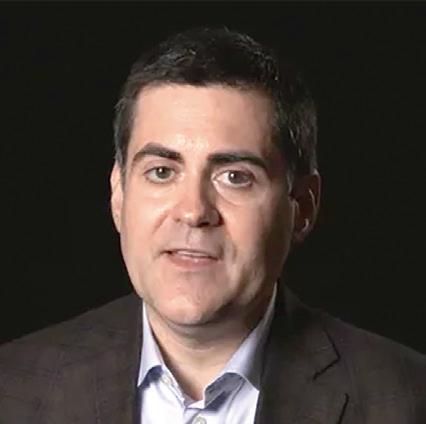
“Treating human life with dignity matters just as much for these women as it does for their unborn children,” said Moore, president of the Ethics & Religious Liberty Commission (ERLC).
“Pregnancy care centers powerfully demonstrate this whole-life compassion that honors the image of God in all.”
Many of the pro-life centers are staffed by physicians and nurses and provide ultrasounds that demonstrate the humanity of the unborn child. The centers’ free services also can include medical consultations, baby clothing and diapers, maternity housing, job training, mentoring programs, and prenatal and parenting classes.
Along with the challenges from state governments, local officials also have placed speech requirements on pro-life pregnancy centers, mandating they post signs, for instance, that say they do not provide abortions or contraceptives or make referrals for the services. NIFLA hopes the Supreme Court “will put an end to this harassment against agencies that help thousands of disadvantaged women each year,” O’Connor said.
The legislative efforts by states and cities are relatively new, but attacks on the reputation and work of pregnancy resource centers are not.
Leading pro-choice organizations such as NARAL Pro-choice America and Planned Parenthood Federation of America have long vilified pro-life centers. On its website, NARAL says, “Socalled ‘crisis pregnancy centers’ (CPCs) are fake health-care clinics that lie to, shame, and intentionally mislead women about their reproductivehealth-care options to block them from accessing abortion care.”
Abortion rights groups also initiate public campaigns intermittently in an attempt to discredit pregnancy resource centers, like the #Expose-
FakeClinics campaign launched for a week in July and renewed in October.
The campaigns push three arguments against pregnancy resource centers, said Vincent DiCaro, chief outreach officer for Care Net, a network of more than 1,100 such centers: (1) Prolife centers only pretend to be medical; (2) they give women deceptive information; and (3) they deceive women into believing they provide abortions.
Money is at the root of the abortion rights movement’s attacks on pro-life centers, DiCaro wrote in a Nov. 1 post on the ERLC’s website.
“Pregnancy centers are a threat to the bottom line of the abortion industry,” he said. “The more that women and men utilize life-affirming alternatives to abortion, the fewer abortions there will be.”
Care Net centers alone saved more than 600,000 unborn children in the last nine years, DiCaro said. “At $500 per abortion, that is $300 million in lost revenue for the abortion business.”
Raquel Williams—statewide director of New Life Pregnancy Center, a ministry of Arizona Baptist Children’s Services & Family Ministries— said the #ExposeFakeClinics organizers have not targeted the centers she oversees. The staff has discussed the effort, however, she told BP.
“As a ministry we want to remain faithful to God and his ministry and diligent as we serve our communities,” Williams said. “Therefore, we are aware of this movement/abortion-rights effort but do not fear it.”
Like many other pro-life centers, New Life finds other matters—especially economic ones on its limited budget—difficult for now, Williams said.
The primary recent challenge for New Life— which has 12 centers in Arizona and one in Mexico—“is being able to provide free ultrasounds to the families that we serve,” she said. “It is a challenge maintaining the equipment, replacing equipment, as well as finding sonographers to perform these ultrasounds at our centers. Although it’s been our greatest challenge we have been able to refer our clients to partnering life-affirming organizations and pro-life doctors for these services.”
The ERLC provided the ministry with an ultrasound machine in 2011. The Southern Baptist entity aids gospel-focused pregnancy centers through its Psalm 139 Project, which provides funds to purchase and place ultrasound machines in such centers.
The longtime effort by abortion rights supporters to keep women away from pregnancy resource centers has had an unexpected benefit, said NIFLA’s O’Connor.
“Abortion advocates have tried to attack and shut down pregnancy centers for decades,” she said. “What’s interesting is that these attacks have made the pro-life movement better and stronger. What the abortion industry meant for evil, God will ultimately use for good.”
Tom Strode is Washington bureau chief for Baptist Press, the Southern Baptist Convention’s news service.
September 2013 will forever be seared in my mind as when I received the phone call every seminarian hopes for: God had called me to my first pastorate.
Recognizing the weightiness of it all, one thing became quite apparent: I was going to need major help. In God’s providence, that help came in a multitude of ways. One in particular was John Piper’s book, “Brothers, We Are Not Professionals.”
With a passion and precision that he is known for, God used this veteran pastor to help shape my understanding of what it means to shepherd the flock of God. His thoughts on preaching were priceless, especially knowing I was to be responsible for the weekly preaching of God’s Word.
Within the wisdom of that book, one practical thought on preaching still reverberates in my ministry today. Piper made sure he preached on abortion at least once a year in his church.
“Pastors should put their lives and ministries on the line in this issue,” he writes. He was appalled at the “cowardice of some pastors when it comes to preaching against abortion.”
The gauntlet was thrown, and I felt the challenge deeply. I can’t fully explain it, but for me, reading those words was one of those moments when a truth concretized in an instant. I was resolved. There would be no cowardice on this issue on my watch.
Tony Merida (an author and pastor in North Carolina) said, “At its most basic level, expository preaching is preaching in such a way that the listeners get wet with God’s Word after the sermon.” Of this I was convinced. But it was Piper who convinced me that if I was going to discharge my pastoral duty faithfully, then I must make a point to preach the truth of God’s Word on the matter of abortion. He persuaded me that some topics are worthy of deliberate considering because they are just that important. The sanctity of human life is one of those topics.
God’s people are immersed in a culture of death. Whether it’s through the world at large, the onslaught of social media posts, or the inescapable daily news cycle, the spiritual forces of evil work overtime to diminish the value of life.
The cosmic powers over this present darkness are crafty in their attacks against the imago dei. They don’t care how they devalue life.
God’s ordained counter-offensive against this attack is preachers who lead their people by their preaching—empowered by the Spirit of God and armed with his Word. If anyone should take up the cause of the unborn, it is the man of God in the pulpit.
That’s not to say everyone else in the church is off the hook on this matter. But it is to say that if everyone else were to remain
silent, there ought to be at least one champion for God’s imagebearers in the womb (and out of the womb, for that matter). That’s you, pastor.
In my own pastoral ministry, I have sought to lead in this way. Over the years, my definition of what I mean by “sanctity of life” has broadened. We generally think of it only being about abortion. But a legitimate category under sanctity of life is the desire for the flourishing of life.
This means in my preaching I’ve not only tried to expose the evil of abortion, but I’ve also sought to bear the gospel on racial reconciliation, proclaim the goodness of God’s design in gender, uphold the roles of men and women in the church and home, and lead God’s people in how to think through issues of euthanasia/suicide.
Now you might be thinking, “Why sanctity of life? Why this issue? Surely there are other matters to fight for as well.” If you think this, you’re right.
The sanctity of life is not the only issue. But it is worthy of a pastor’s prophetic voice in a world full of ears itching for teachers to suit their own passions.
My encouragement to you is the same mandate from Piper that fell on me: “Brothers, blow the trumpet for the unborn.”
Jonathan Davis is pastor of Delta Church in Springfield.

Desiree is a hard-working young mother with a sweet personality and a smile that can light up a room. There was a time, however, when her life was wrecked by an addiction she could not overcome.
Desiree was the mother of three little boys when a severe drug addiction took control of her life. Her habit resulted in several jail sentences, and her sons were eventually removed from her home. The pain of losing her boys provided Desiree with the motivation to get herself clean, but doing so would be no easy task.
“No matter how hard I tried, I just couldn’t manage to stay sober,” she said. “I knew at that rate, I was never going to be able to get my boys back.”
Further complicating her situation, Desiree became pregnant with her fourth child. It was her probation officer who put her in contact with Angels’ Cove Maternity Center, a ministry of Illinois Baptist Children’s Home and Family Services. After finishing rehab, Desiree came to live at the maternity center—a move that proved to be a turning point in her life.
With the help of the Angels’ Cove staff, Desiree (left) began working to put her life back together. In the process, she saw God begin to work in her life. One major challenge she faced was finding suitable employment. She interviewed for a job at a local restaurant, but didn’t receive a call back. Later that week, she had another interview, but the staff was so rude to her that she left feeling dejected.
“I was so upset,” Desiree remembered. “I went back to my room, prayed, and asked God for help.”
Later that afternoon, she received a phone call from the original restaurant, wanting to set up her orientation. With the answered prayer, God had gotten her attention, and Desiree began to flourish in her job as a dishwasher at the restaurant.

She has since been granted extended visits with her three boys and continues to work toward full reconciliation. She earned her driver’s license back for the first time in 10 years and is working toward buying her own vehicle and finding suitable housing. She plans to go back to school when her youngest child is a little older.
“Through all this, I have learned that God is real,” she said. “He has provided for me at times when I least expected it. I love going to church with my children and watching them learn Bible stories. Being at Angels’ Cove has changed my life.”
For more information about Angels’ Cove and Baptist Children’s Home and Family Services, go to bchfs.com.
– From BCHFS Summer 2017 newsletter

If anyone should take up the cause of the unborn, it is the man of God in the pulpit.
“Let’s make a bold, fresh start for the New Year... Switch places with me.”

Christian parents gathered last August in Nashville, Tenn., for a conference sponsored by the Ethics and Religious Liberty Commission. The theme—Christcentered parenting in a complex world—was expounded upon by pastors, teachers, authors, and family experts in sessions focused both on modern-day parenting questions and universal family challenges.
One speaker, Jen Wilkin, taught a session titled “Raising an Alien Child,” based on the passage in 1 Peter where Christians are urged, as aliens and strangers, to live differently. Or, as Wilkin put it, to “trade the comfort of fitting in for the calling of standing out.”
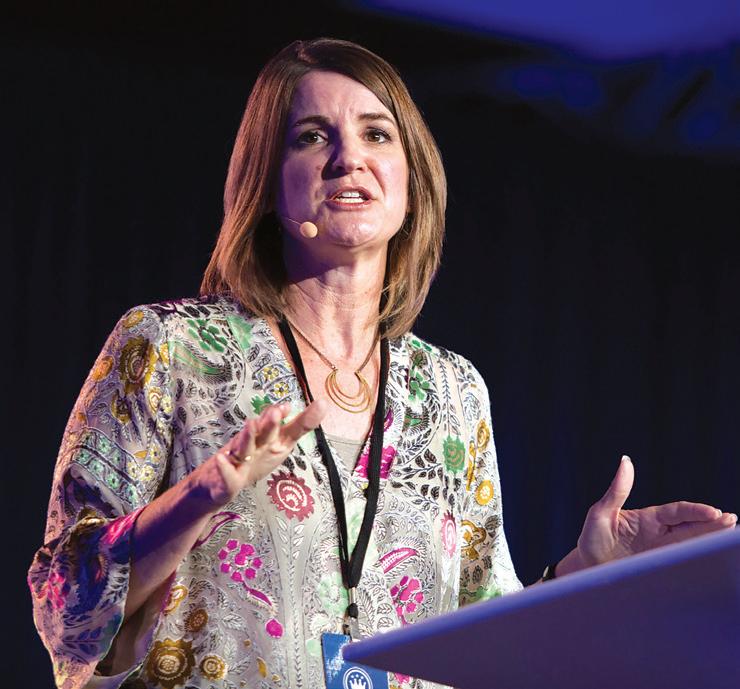
Raising alien children requires parents themselves to be comfortable with being “strange” in the current culture. But what does that look like in the context of church and community? This year, the Illinois Baptist will publish a series of stories on parenting in a complex culture. We’ll feature families who are operating counter to the larger culture, but still working to engage their neighbors with the gospel.
In this issue, we’ll explore the role of home and community in equipping kids to prioritize the needs of their neighbors over their own. The families included here are leveraging their houses, resources, and schedules for the sake of the gospel.
Look for more parenting stories in future issues of the Illinois Baptist.
BY MEREDITH FLYNNIt starts with a simple invitation.
“Have dinner with us.”
In a world where people tend to isolate themselves from their neighbors, Chad Williams and his family are recapturing an old-school concept to make a gospel difference in their community.
The family of five has a vision for biblical hospitality. They’re on a mission to bring people into their home and around their table to hear the gospel.
“They need Jesus, so we want them to come over to our house and see what it looks like to be a family that follows Christ,” said Williams, former family pastor at Tabernacle Baptist Church in Decatur and the new senior pastor of Rochester First Baptist Church.
“All of our flaws, all of our issues, our dirty house,” Williams said. “This is who we are.”
Families embrace ‘strangeness’ for the sake of the gospel
The Williamses try to designate one night a week to invite people to their home for a meal. It’s not fancy—tacos or chili. And it’s not necessarily reciprocated. But the family has been able to sow seeds of the gospel, and they’ve seen results. Recently, they invited a family from church to dinner. The father, not yet a Christian, engaged in several hours of conversation with the Williamses.
“He had a perception of who Christians were…as he got to spend time with us, there became this openness,” Williams said. A few weeks later, the man decided to follow Christ.
Asked if the commitment to spend time with others each week impinges on their family time, Williams said no, because it’s a shared commitment. The family is still at home, still sharing a meal together. They’re just inviting another family to join them. “We see this as part of our mission,” he said, “and we want to be on mission as a family.”
Chris Merritt and his wife, Alyssa, moved to Blue Mound, Ill., seven years ago. Both raised in central Illinois, the couple knew they wanted to live in a smaller town. Blue Mound, a community of around 1,200, is where they’re raising their two pre-teen sons.

Their church, Tabernacle Baptist in Decatur, sponsors two small groups in the region where the Merritts live. Along with their fellow life group members, the family is invested in building relationships in Blue Mound through community activities and by simply looking for opportunities to meet needs.
About a year ago, the Merritts approached their local school to see how they could help out. When the principal identified mentoring as an area of need, the couple and others from their church started a mentoring program.
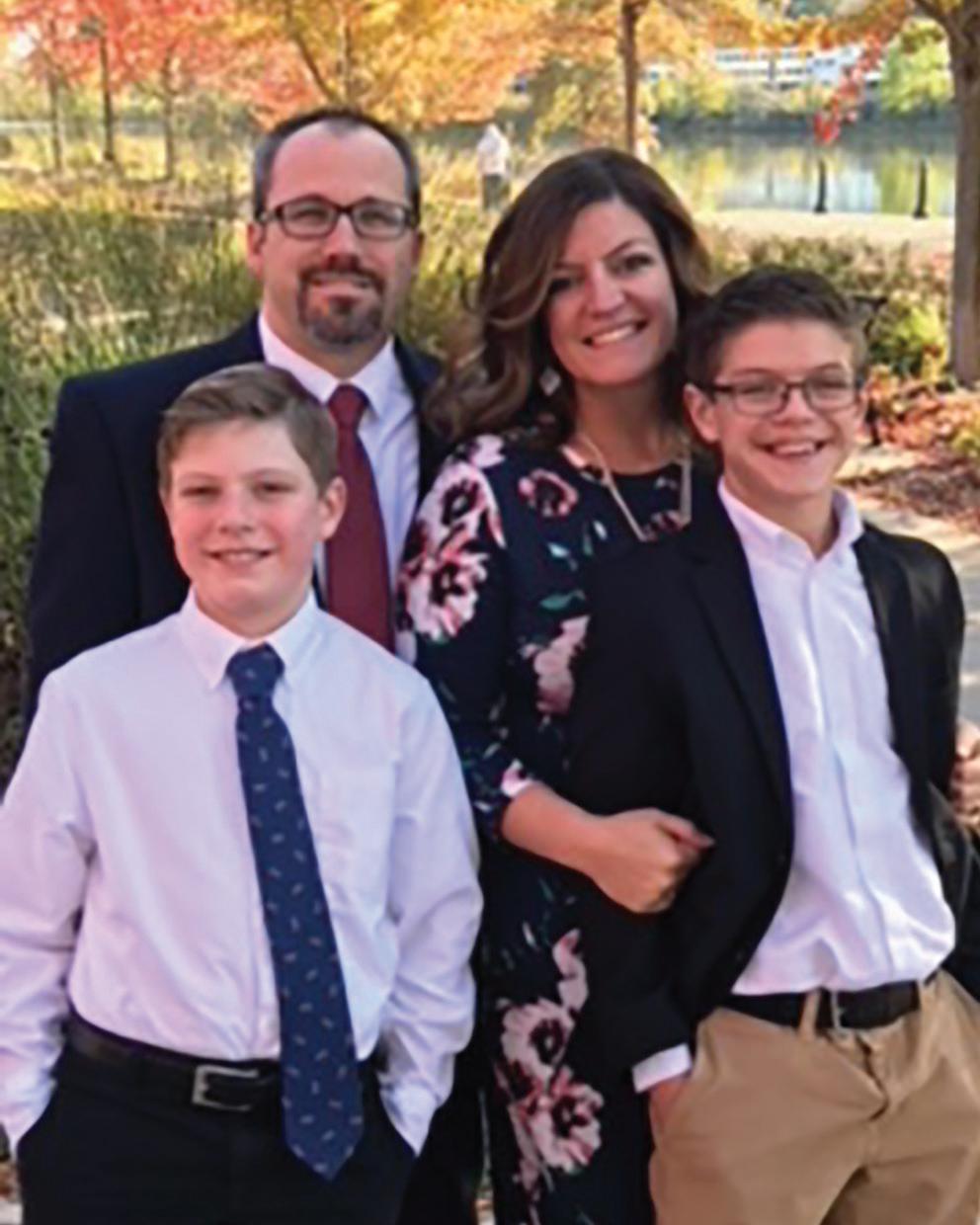
“It’s just a regular, consistent positive influence of adults into kids’ lives who maybe need an extra positive influence,” said Merritt, who serves as church administrator at Tabernacle. The 12 students in the mentoring program have lunch every other week with their mentors. For that hour, he said, someone is asking them questions, encouraging them, and helping them make good decisions.
Outside of the mentoring program, the Merritts also are involved in Blue Mound through community sports leagues—the kids as players, and Merritt as a coach. He said being involved in the community through their kids’ activities is a natural choice. And they try to be intentional about making the most of their opportunities.
“If I’m going to dedicate time for our children to be at these things, it’s logical for us to be there not just to support our children, but to build relationships in our community too.”
Faith in action
Erica Luce credits her husband’s upbringing for her children’s willingness to serve their neighbors. “Dan spent his life serving others because his parents were so others-focused,” said the member of Delta Church in Springfield. That’s why their three children can often be found raking or shoveling to help a neighbor, or baking a welcome present for neighborhood newcomers.
“It’s given us so much room to speak truth into other people’s lives that are not really even seeking God,” Luce said. “They see faith in action, whether they want it or not.”
It’s been contagious on their block too, she said, recalling a time when her 12-year-son was shoveling a neighbor’s driveway and another neighbor came out to help.
Seeing the family home as missionary tool—whether it’s a place to invite people to, or a place missionaries are sent out of— is something Christians needs to recapture, Chad Williams said. Too often, we’ve lost the idea that our neighborhoods and workplaces are mission fields. Instead of seeing people’s need for Jesus, we see our co-workers and neighbors simply as people we interact with—and, if they’re hurting, we often don’t know it.
Rather than backing away from a culture that seems increasingly far from the gospel, Christian families have an opportunity to lean in closer, Williams said.
“If we really want to make an impact and get to know them, we’ve got to start engaging them in a way that they’re not expecting.”

If we really want to make an impact and get to know our neighbors, we’ve got to start engaging them in a way that they’re not expecting.– Chad Williams, Rochester First Baptist Church

Frank Gervasi is pastor of First Baptist Church, Odin. A native of Chicago, he accepted Christ at an inner-city church while in his 20s.
Family: The Carruthers family is a loud, crazy, passionate, loving, forgiving, and strong family of six. My wife, Alysia, and I met at a summer associational youth camp while attending Hannibal LaGrange University. We have four kids: Jace, 11, Jonas, 10, Addyson, 7, and Ayla, 5.
Ministry history: I have served in different churches around Missouri in a variety of roles, including lead pastor, youth, worship, media & communications, and church planter. I also have more than 10 years of sales and business development experience.

Favorite thing about church as a kid: My favorite thing was sitting with our pastor’s wife while my parents were in different church meetings. She was very influential on me when I was a little kid and always had something fun to do.
Favorite thing about church today: Our small group reminds me of the powerful influence of the church family.
Favorite movies: I am a sucker for sports movies: Rudy, Remember the Titans, The Legend of Bagger Vance, Hoosiers, and Glory Road
Favorite Scriptures: My life verse is 1 Timothy 4:12 where Paul is challenging Timothy to lead by example despite his youthfulness. Another passage that always helps me find strength in the chaos of life is Psalms 46:10: “Be still and know that I am God.”
Clay City | Ruth Trowbridge remembers crying as a fourth grader when she heard about the great poverty and spiritual need in India. Now in her 60s, Trowbridge was 10 when a school lesson gave her a burden for a country on the other side of the world.
“Somebody needs to tell them about Jesus,” she thought then.
Last September, Trowbridge finally traveled to India to do just that. After years of dreaming
of Community Baptist Church in Clay City. The Trowbridges traveled with a small team led by Southern Baptist evangelist Bo Shedd. Along with facilitating training sessions for adults, their team worked with children and also led evangelistic services in the evenings.
During their two weeks there, the team ministered to more than 1,000 people. In India, Trowbridge said, only about 1% of people are evangelical Christians. And in the villages where her team worked, people have had no way of hearing the gospel.
Gervasi is an alumnus of Moody Bible Institute, and has served as a chaplain endorsed by the Southern Baptist Convention and a missionary with the North American Mission Board. He and his wife, Julie, have three children.
Chad Williams is the new pastor of Rochester First Baptist Church. He previously served as family minister at Tabernacle Baptist Church in Decatur, and was a student minister at churches in North Carolina and Tennessee. Williams is a graduate of King College and The Southern Baptist Theological Seminary. He and his wife, Jennifer, have three sons.
about a mission trip, she went with a small group of Americans to help train Indian Christians to share the gospel. Through an interpreter, Trowbridge taught a women’s Bible study. Her husband, Ed, worked with local pastors.
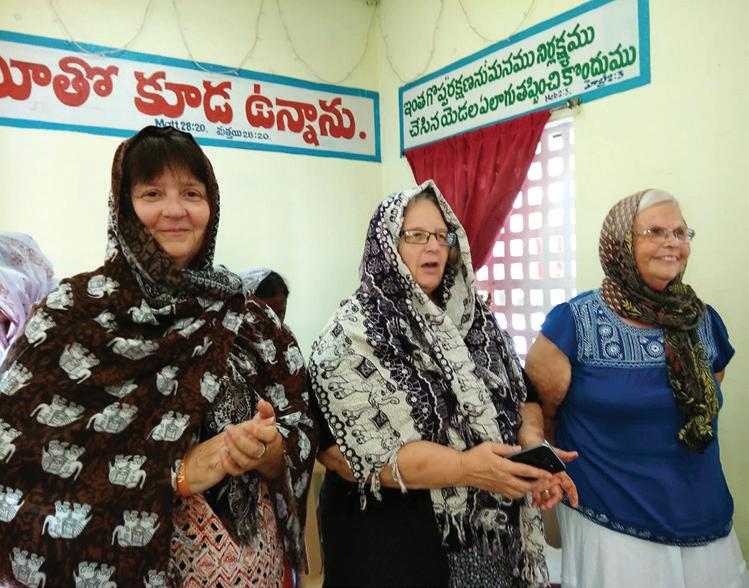

“It was a dream come true,” said Trowbridge, a member
“You’d think there wouldn’t be a part of the world left where they haven’t heard the gospel,” Trowbridge said. The team worked with an Indian family whose Christian heritage goes back to missionary William Carey. The family has planted several churches in remote villages in southern India, and have also established a training center to help pastors in the region.
When asked if her trip was everything she’d imagined it would be, Trowbridge said, “And more.” She’s already planning and praying about a return in early 2019.
Alan Summers, pastor of First Baptist Church, Creal Springs, died Dec. 22 at the age of 66. Summers, a lifelong pastor and teacher, served many churches in Illinois, including First Baptist in Bluford, Calvary Baptist in West Frankfort, and Springhill Baptist in Creal Springs. He pastored FBC Creal Springs for 15 years. He also taught driver’s education at West Frankfort High School for many years.

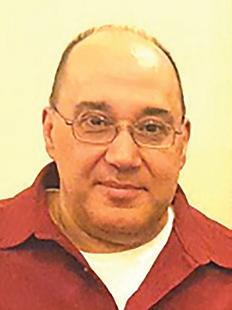
Summers is survived by his wife of 46 years, Diane; daughter, Ashley; two siblings; and many extended family members.
Faith Baptist Church in Marissa is seeking a bivocational pastor. Submit resumes to 1225 Schoolview Dr., Marissa, IL 62257, or e-mail Pam Welshans at pami_5@yahoo.com.
Third Baptist Church, West Frankfort seeks a full-time or bivocational pastor. We desire candidates evidence of diligent work, a heart for the community, seeking God’s will, friendliness, and doctrinal integrity consistent with historic Baptist beliefs. Formal education welcomed, but not more important than the qualities listed above. Send resumes, including calling and testimony, to Third Baptist Church, 1100 West 6th St., West Frankfort, IL 62896, or 3rdBaptistSearch@gmail.com.
Pleasant Hill Baptist Church seeks a parttime director of youth ministries. The principle function of this position is to build young disciples for Christ by developing and implementing a comprehensive approach to youth ministry, while serving as a spiritual leader and role model. Please send a resume and cover letter to phbcsearch@ yahoo.com.
First Baptist Church, Zeigler, is seeking a bivocational pastor whose ministry is to seek God’s will, a love for the church family and community, and doctrinal integrity consistent with Baptist beliefs. Formal education is welcomed but will not be considered more important than these qualities. Please send resumes to First Baptist Church, 106 S. Pine St., Zeigler, IL 62999, or fbzsecretary@ mchsi.com.
January 22
What: “Everyday Obedience” by Katie Orr, facilitated by Carmen Halsey Register: IBSA.org/Women
January 23-25
What: Focused equipping for leaders from Baptist state conventions across the Midwest Where: Crowne Plaza Hotel, Springfield Info: MWAdvance.org
Registration: BarbTroeger@IBSA.org
February 2-3, 9-10
Unspoken: Men’s Conference Simulcast
What: Teaching from Johnny Hunt, former SBC President and pastor of FBC Woodstock, Ga.
Where: Feb. 2-3: Proviso Missionary, Chicago; Redeemer, Urbana; Liberty, Pekin; Western Oaks, Springfield; Oblong FBC; Bethel, Vandalia; Calvary, Alton; Steeleville FBC; Carrier Mills FBC; Feb. 9-10: Rebroadcast, Machesney Park
FBC
Register: IBSA.org/Men
February 8
What: Introduction to IBSA staff, ministries, training, and opportunities, for pastors and church staff members
Where: IBSA Building, Springfield Info: TammyButler@IBSA.org
February 12-13

What: Training for new local church women’s ministry leaders
Where: IBSA Building, Springfield Register: IBSA.org/Women
February 17
What: Learn to use technology for outreach and for worship
Where: IBSA Building, Springfield; 8:30 a.m.-1:30 p.m. Register: IBSA.org/worship
February 19
What: Encouragement and renewal for pastors and wives
Where: IBSA Building, Springfield Info: RichCochran@IBSA.org
What: Learn about LifeWay’s 2018 “Game On!” curriculum
• Feb. 24: Chatham Baptist Church
• March 3: FBC Carterville
• March 17: Pleasant Hill, Mt. Vernon
• April 7: Broadview Missionary Baptist
• April 21: Northside, Dixon
When: Registration begins at 8 a.m., clinics are 8:30-noon Register: IBSA.org/Kids
Jan. 27: Lincoln Avenue, Jacksonville; 8:30 a.m.-noon
Feb. 6: FBC Christopher; 5:15-9:00 p.m.
Feb. 16-17: Woodland, Peoria
March 2-3: Tabernacle, Decatur
20-21: Crosswinds, Plainfield
Mini-trainings offer Disaster Relief 101 and flood recovery classes. Two-day sessions include chaplaincy and intro courses beginning Friday evening, and specialty classes offered Saturday.

For more information and to register, go to IBSA.org/DR.
QMy father-in-law started a business as an LLC few years ago. He named all his daughters owners, with him owning the majority share. The business failed, and now he is being sued by creditors. He told the family these creditors can’t come after us and the other siblings, because he is the majority owner. Is this true, or should we get a lawyer?
AYour wife is probably not in danger, unless she signed paperwork making her liable for a loan or liable with a creditor. If she signed official, legal paperwork – like if she went down to the bank and signed on a loan –then she’s liable. It’s that simple. That would make her, or any of her siblings who did this, comakers on the loan.
Your wife, and any of her sisters, who signed on trade accounts taking supplies from a supplier and paying them could also be liable. But they are not automatically liable simply because they were listed as minority owners in an LLC, or even a sub-S corporation. If it were a general partnership, there’s a possibility they could be liable. That’s one of the reasons I hate general partnerships. I hate partnerships in general, but I hate general partnerships, too!
In other words, I think you’re okay. I would still advise speaking with an attorney, and giving him or her all the details of this situation, to be absolutely certain.
Financial advisor Dave Ramsey is a prolific author and radio host.

QWhat do you think about online investing apps, and the way they allow you to jump in and out of stocks for really low fees?
AI don’t think about them, and I don’t use them. I don’t play single stocks—period.
There’s a ton of research out there showing that people who play individual stocks on their own—or with their broker, or with a golfing buddy—see a rate of return of about 7% on average. You can make anywhere from 10-14%, on average, with good growth stock mutual funds.
I could probably play single stocks more intelligently than most people, but why? If the average is noticeably less than I’m seeing with my mutual funds, why bother going there? Plus, with a mutual fund portfolio, you’ve got someone who does this kind of thing for a living managing and researching your investments for you in your best interest.
I don’t have an app on my phone that lets me trade stocks, nor do I plan on getting one. There’s nothing wrong with apps, in general, but I’ll never recommend jumping in and out of single stocks as a method of investing.
Will your church be a part of the challenge? See more at IBSA.org/Evangelism, and look for the link to register your church.
Let’s make EVANGELISM a priority!
QI heard that after bypass surgery, you led six nurses to Christ at the hospital’s fitness center. Should I join a gym so I can have some people to witness to? (It seems safer than having a heart attack.)
AActually, it was eight nurses, but I wouldn’t recommend open-heart surgery as an outreach tool! However, an exercise class or gym membership would provide an opportunity for you to meet all types of people. And, because people exercise to focus on their health and ways to have a long life, it opens the door to spiritual conversations about the afterlife.
Location: Cobden and Alto Pass
Focus: Hispanic residents
Characteristics: Hispanic workers have been employed by the region’s peach and apple orchards for many years, and many of the workers have found permanent jobs in the area. The Cobden school district has close to 50% Hispanic enrollment, and there is no Spanish-language, gospelpreaching church.
Prayer needs: Pray God would raise up people who are able to share the gospel in Spanish and willing to build relationships with Hispanic residents in Cobden and Alto Pass.
Being a courageous witness might just surprise you as to how open people are to the truth. I’ve found that most people are looking for hope, peace, and assurance. Those are things the world can only offer on a temporary basis. Be ready to help others find the real thing in Christ Jesus (I Peter 3:15)!
QOur church has small groups that meet in members’ homes. We have never found a solution to the issue of child care. Hire a sitter? Take turns babysitting in the basement? Or let the kids run wild? We’ve tried them all. Thoughts?
AIf you have college students nearby or mature high schoolers (ages 16-18) who would benefit from a small stipend, I’d see if you could coordinate a working schedule with them. Each person in the group could contribute a couple of dollars, or perhaps the church would be able to pay an hourly wage while the Bible study group is meeting.
Another option would be to enlist women from the community who would like to watch the children. But, you would need to do a background safety check on each one, and also arrange an agreed-upon payment.
One other idea, and you alluded to this in your question, would be for the families in the group to rotate watching the children each week.
Pat Pajak is IBSA’s associate executive director for evangelism. Send questions for Pat to IllinoisBaptist@ IBSA.org.

Read: Isaiah 41:10
We live in a culture filled with fear; fear of war, fear of financial shortage, fear of death. One of the most common fears in all humanity is the fear of being alone. In Isaiah 41, the children of Israel were wrestling with fear while wondering if God would abandon them because of their disobedience.

But there was one big reason not to fear: The Lord was with them and had promised them success. Since God is the same yesterday, today, and forever, just like Israel, you and I have no need to fear. The God who chose you will not forsake you, because he has a plan and purpose for your life.
As Illinois turns 200 in 2018, IBSA is seeking to engage at least 200 churches in each of these challenges. Is your church one of them? ENGAGE NEW PEOPLE – Evangelism



As of January 10 Goal: 200
ADRON ROBINSONWhen fear tries to overtake you, remember first to trust God’s presence. God’s servants do not need to fear the shifting sands of society, government, or sinful humanity, because the God of all creation is with us.
Secondly, we must also trust God’s commitment. Often, we become fearful or confused when we stare at our circumstances and away from our God. Don’t make circumstances big and God small! Lastly, we must trust God’s power. He is omnipotent and he will strengthen and sustain his servants in the midst of life’s trials.
PRAYER PROMPT: Faithful and ever-present Father, help us to trust in you and stand on the promises found in your Word, that we may be anxious about nothing and trust you in everything (Philippians 4:6-7).
Adron Robinson is pastor of Hillcrest Baptist Church in Country Club Hills and president of the Illinois Baptist State Association.
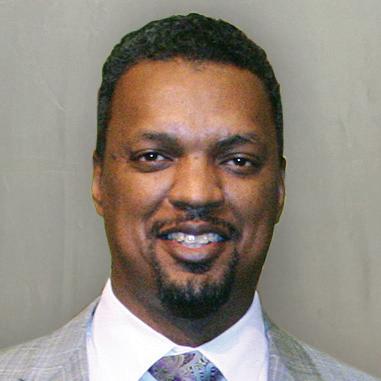
31
Churches Churches Churches Churches
Total Participating Churches: 57
Read more about these challenges and register your church for one or more at IBSA.org/pioneering, or contact IBSA’s John Carruthers at (217) 391-3110 or JohnCarruthers@IBSA.org.

Learn more about “Pioneering Spirit” in the next issue of the newly redesigned Resource magazine. Plus, find outreach ideas and planning tips. For a free subscription, go to IBSA. org/Resource or e-mail Communications@ IBSA.org. Resource is also available online at Resource.IBSA.org.
